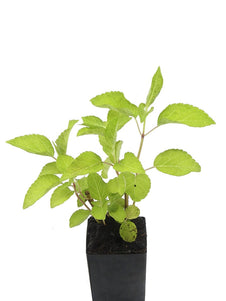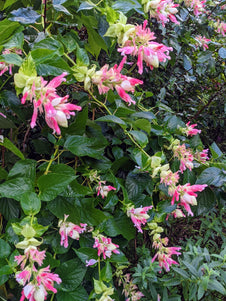





Salvia wagneriana
Salvia wagneriana

- Low stock - 6 items left
- Inventory on the way

Usually available: All year
Life cycle: Perennial
Height: 1 - 1.8m
Position: Sun / part shade
Soil preference: Well drained
This is how we pack and send your Herb Plants to all states except TAS & WA
You will receive
- 1 Salvia wagneriana Herb Plant in a 50 X 75mm tube - General growing instructions
All of our Herb Plants are grown organically with certified organic potting mixes and fertilizers
Botanical Name: Salvia wagneriana
Salvia wageriana is a large sage, growing up to 1.8 meters high and wide in ideal conditions, but often reaches only 1 meter in cultivation. This tall plant is in the sub-shrub category, meaning it has both woody growth and soft, perennial herbaceous growth. The new leaves are bright green, felt like, and triangular in shape. The flower colour is variable, but they are usually either a bright, rich pink with dark pink calyces, or a lighter pink to cream with green to pink calyces. There is also a cultivar with white bracts. The flowers appear in winter and are held on tall stalks up to 30cm long. In Australia, they should bloom from May to July and they are very similar to the flowers of Salvia karwinski.
Bees, butterflies and even native birds that can access the nectar find this plant very attractive. The native habitat of Salvia wageriana is the cloud forests of Central America and Southern Mexico where is grows at altitudes of 1000-2000 meters. The conditions in these areas may be hot and humid, but also cool and moist at times. This plant may also be called Wagner’s Sage. It was named by Central American explorer and botanist, Helmuth Polakowsky (1847-1917). The name is thought to be for botanist Moritz Wagner, who was an early explorer and friend of Charles Darwin. The Mexican people consider Wagner’s Sage to be so beautiful that it is one of the few native plants they plant in their gardens.
The salvia family has over 900 members with an extensive history as culinary, medicinal and ornamental plants. Ornamental salvias have become collectors items, as gardeners try to find a place in their garden for each and every one. There are salvias that will suit every type of soil and climate. More information on the Salvia genus and Common Sage (Salvia officinalis) may be found on our Common Sage page.
Growing Conditions
Salvia wageriana prefers full sun and can take some shade. The natural habitat for this plant is hot and humid conditions for much of the year, so moisture is important. It will do well in tropical areas or gardens where the soil is continuously moist, so regular watering is vital. Rich soil is preferred so compost or enrichment may be required for the home garden. As noted earlier, this tall salvia is winter blooming and will survive cold conditions and is quite frost tolerant.
Wagner’s Sage needs space and grows well as a tall background plant and is also very useful for cut flowers. Although this plant has been known to grow up to 3 meters, it averages 1.8 meters high with many home gardeners finding it is much smaller. You may find need to choose a position that can accommodate the various possibilities. Pruning is suggested in mid to late summer to encourage dense growth and this will also keep the plant smaller if required. Following pruning, the flower spikes will appear in winter amidst the new and soft, herbaceous growth. Propagation may be by dividing the root ball or by collecting seed for sowing at a later date.
All information provided on this website is for informational purposes only. Please seek professional advice before commencing any treatment.





